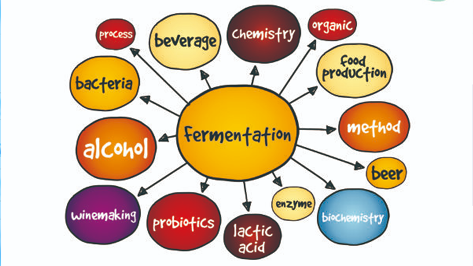FERMENTATION
Fermentation
Fermentation is a metabolic process in which an organism converts carbohydrates into alcohol or organic acids using microorganisms such as yeast or bacteria. It is a process used in food production, such as in the production of beer, wine, and bread, as well as in the production of biofuels and other industrial products. Fermentation is also used in the production of enzymes, and in the preservation of food.

Types of Fermentation
1. Alcoholic Fermentation: This type of fermentation involves the conversion of sugar into alcohol and carbon dioxide. It is commonly used in the production of beer, wine, and other alcoholic beverages.
2. Lactic Acid Fermentation: This type of fermentation is used to produce lactic acid, which is used in many food products. It is commonly used in the production of yogurt, cheese, and other dairy products.
3. Acetic Acid Fermentation: This type of fermentation is used to produce acetic acid, which is used in many foods as a flavoring agent. It is commonly used in the production of vinegar.
Advantages of Fermentation
1. Improved Nutritional Value: Fermentation helps to increase the nutritional value of foods by breaking down complex carbohydrates, proteins, and fats, making them more easily digestible.
2. Improved Flavor and Texture: Fermentation also helps to improve the flavor and texture of food by producing lactic acid, which adds a sour taste. It also helps to increase the shelf life of certain foods by inhibiting the growth of bacteria and other microorganisms.
3. Production of Health-Promoting Compounds: Fermentation can also help to produce health-promoting compounds such as probiotics, enzymes, and vitamins. Probiotics are beneficial bacteria that help to improve digestion and boost the immune system, while enzymes are proteins that help to break down food and make nutrients more available for absorption. Vitamins produced during fermentation can also help to increase nutrient absorption.
